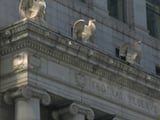I want to continue on the path I started with yesterday’s rerun post, but a couple of things came across my desk today that, together, warrant discussion. They’re examples of the kind of slow, steady progress in the economic recovery that, over time, is adding up to big things.
Let’s start with Washington, DC. The federal government—and particularly Congress—has been part of the problem for so long we kind of expect it to be a drag. The recent unexpected budget agreement (for two years even) was a positive sign, but it left open the possibility that legislators wouldn’t be able to agree on actual spending numbers. The passage of a spending bill yesterday by the House on a vote of 359–67, with 167 Republicans voting in favor, says that both parties are now focused on solutions rather than creating train wrecks as a negotiating tool. In particular, it shows that the Tea Party caucus no longer has the power to force the rest of the Republican party to vote against a deal. You can argue over the economics or the politics, but the uncertainty created by the prior theatrics was undeniably harmful, and the fact that they’ve come to an end (at least for now) is a good thing. This is also a good signal for the pending debt ceiling negotiations early next month.









